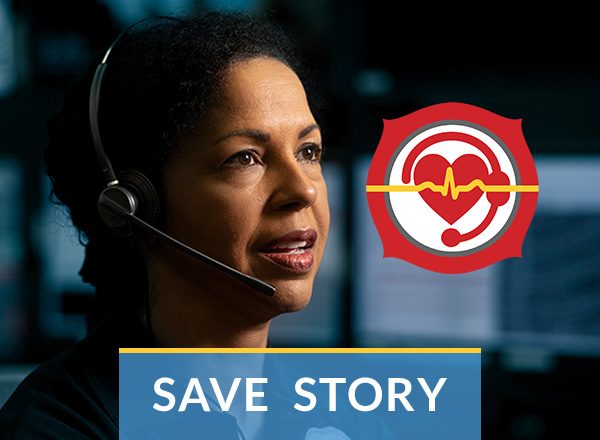December 26th, 2021 brought an unusual holiday snowfall on Washington’s Olympic Peninsula. PENCOM dispatcher Brooke Pucciarelli was working her shift and received an urgent 911 call for a man in cardiac arrest.
The caller reported the patient had not been feeling well and was making strange snoring sounds. Dispatcher Pucciarelli immediately recognized that the patient was likely in cardiac arrest and began working with the caller to get the patient in the proper position for CPR. The caller had difficulty moving the patient and Dispatcher Purcciarelli used her skills and training to talk the caller through moving the patient, knowing time was quickly passing. It was discovered the caller was not able to move the patient, so she quickly moved into alternate CPR on the bed. As Dispatcher Puciarelli began CPR instructions, the caller became nervous and apprehensive, but she was able to convince him to follow her lead and begin lifesaving efforts. As medical help was dispatched, the caller became distraught and afraid. she continued to keep him calm and focused, encouraging him to continue CPR until help could arrive.
Due to the unusually large amount of snow on the roads and the rural location of the patient, responding volunteer fire crews were further out than normal. Dispatcher Pucciarelli knew that time was of the essence and as the caller tired out, she talked him through continuing even though he wanted to stop. The first volunteer fire unit arrived nearly 33 minutes into the call, with the patient down for over 29 of those minutes.
Chief Greg Waters of Clallam Fire District 4 later recalled that the first AED arrived on scene 33 minutes into the call and responding fire crews found a distraught and exhausted rescuer waiting for them. The patient was completely unresponsive and pulseless. They applied the AED and after continued CPR, were able to get a shockable rhythm and transport the patient.
Chief Waters later spent several weeks trying to determine the outcome of the patient. In an email to dispatch supervisors he described leaving several messages at the house, but never heard back. “I assumed the worst”. Chief Waters decided to try one last call and was surprised someone answered the phone. He soon discovered the man answering the phone was, in fact, the patient. He had survived and made a full recovery! Chief Waters said “I can say without a doubt, if not for Brooke’s efforts, this patient would not have survived. Somehow, she was able to coach the roommate through the entire process, but more importantly, kept him going when he wanted to quit and give up”.
The patient had so many obstacles to his survival, but the outcome was favorable due to Dispatcher Pucciarelli’s persistence, training and encouragement. Her actions allowed the arriving EMS to continue the chain of survival and the patient to make a full recovery. RQI Quality Manager Adrienne Maloney has worked with Dispatcher Pucciarelli on her skills mastery through simulation practice. “I’m thrilled that Brooke has utilized the skills we have worked on during simulation practice in real-world calls. The practice and mastery of working with callers in challenging situations has had a direct impact on this patient’s outcome”.









